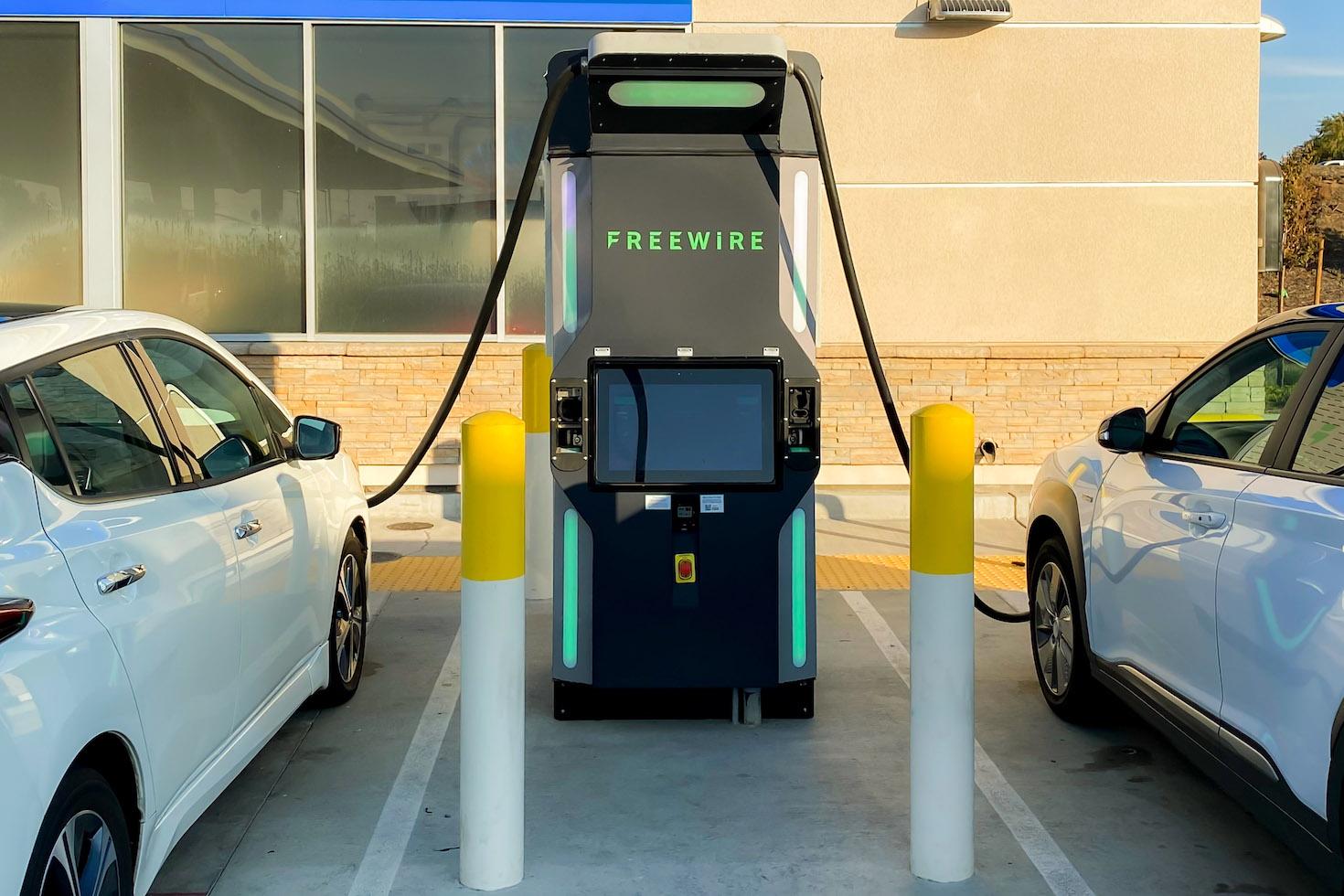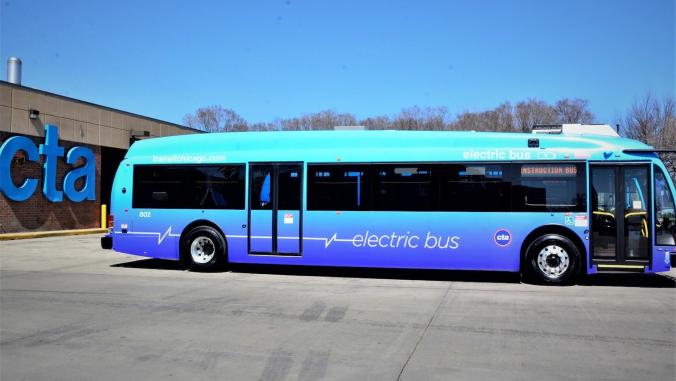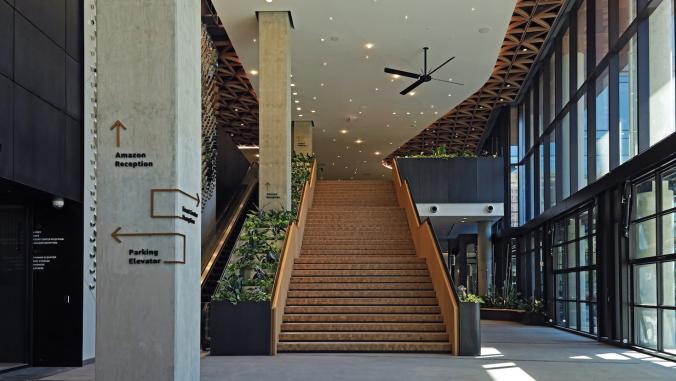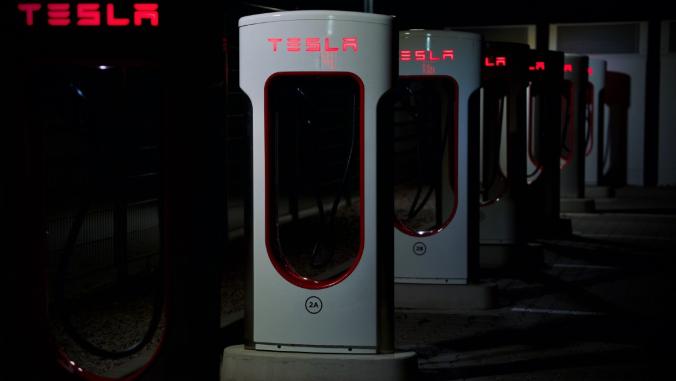The race to build EV charging infrastructure has companies breaking ground and installing stations in all kinds of places: parking lots; rest stops; retail stores and beyond.
But some charging companies are sidestepping that type of infrastructure altogether, instead offering mobile EV charging solutions that can be easier and quicker to deploy.
The likes of FreeWire and SparkCharge are growing in a space where demand for charging continues to outstrip traditional infrastructure. The solutions on offer, however, vary widely — from "charging-as-a-service" that can give stranded drivers a boost, to semipermanent installations at events or construction sites.
Here’s a look at how SparkCharge and FreeWire are accelerating EV charging access.
SparkCharge brings fleets up to speed
SparkCharge’s products are probably what you think of when you think of portable EV charging.
The first offering it developed in 2020, the Roadie Portable, is essentially a stackable set of batteries that can deliver DC fast charging to EVs. Josh Aviv, the Boston-based company’s CEO, said they’re ideal for small fleet owners or event installations. That’s because they can be dropped off on location, without needing electricity grid upgrades, and immediately start delivering a charge. When the batteries run out, they can be topped off by plugging directly into a standard wall outlet.
But as demand from larger businesses and fleets grew, SparkCharge developed the Roadie V3. This is a mobile charger (again, basically a huge battery) that lives inside an electric van and travels around delivering DC fast charging to fleet vehicles.
"With the rise of EVs and incentives for clean transportation, we are seeing many fleets add electric vehicles. The problem is the lead times for charging infrastructure are increasing," Aviv said in an email. "SparkCharge steps in to offer a turnkey solution for businesses using EVs by delivering DC fast charging to the lot or to the vehicle."
He calls this "charging-as-a-service," and says it can work for centralized and decentralized fleets, such as rideshare companies. The traveling charging van is also used for a service called "Out of Charge," a program where SparkCharge will top-up a client's vehicle that’s low on battery by delivering 20-50 miles of range so the vehicle can reach its destination. For reference, a smaller EV such as a Nissan Leaf has a range of about 150 miles on a full charge.
So far in 2023, SparkCharge says it has powered 1 million vehicle miles by delivering 500 megawatts of electricity. Its customer base — including the retail and real estate industries, as well as public agencies and event producers — spans 382 cities in the United States. And across all of its services, Aviv sees flexibility as the main strength of the SparkCharge model — and of mobile EV charging more generally.
"With a traditional fixed charging station, adding more vehicles to your fleet means having to purchase more [equipment]; higher costs, and time," Aviv said. "We allow businesses to electrify their fleets quickly at a lower cost."
FreeWire provides ‘pop-up’ access
FreeWire started out in 2014 doing much the same thing as SparkCharge: Offering charging as a monthly subscription service, trucking around a mobile charging unit from one vehicle to the next.
The California-based company has since pivoted significantly. "It was really hard to come up with something compelling for that market size," said Ethan Sprague, FreeWire's senior vice president of sales, marketing and public policy. He said the physics of creating a highly mobile charging unit were too challenging to scale.
Instead, FreeWire developed its Boost Charger products, which are about the size of a phone booth, but not designed to be moved around constantly. Instead, the company deploys them at gas stations, parking garages or retail stores — where they usually stay in the same place for at least a few months at a time. FreeWire’s target customers are retail chains, fleet managers and even car dealerships.
So while they’re not highly mobile, FreeWire’s chargers share the same advantage as those from SparkCharge: They contain batteries. That means they can plug into standard, low-voltage grid infrastructure — without any costly upgrades — and charge up slowly, but then deliver a DC fast-charging output to EVs.
"Everything you need, except for the low-voltage input power, is all integrated into one unit," Sprague said. Yet they’re compact enough to load onto a trailer and drop at a temporary "pop-up" installation, such as a park or a concert.
If a charging unit is completely drained, it takes about eight hours to top up on that low-voltage power source. Sprague said the Boost chargers can usually handle 15 to 20 charge sessions a day, bringing vehicles from 20 to 80 percent charged.
Sprague said the company has built about 700 of these units so far, and can install them much faster than traditional, permanent chargers, which often require monthslong grid upgrades. And while FreeWire chargers typically have a 30 percent higher upfront cost compared with traditional counterparts, the company says "they offer substantial long-term operational cost savings, reducing annual expenses by as much as 70 percent, resulting in a quicker ROI."
In addition to the physical chargers themselves, FreeWire also sells an array of business services. Sprague said the company helps customers analyze demographics and EV adoption trends to decide where to add chargers, and how to market them. "We’re providing what we call solutions services," he said. "We’ve moved from being a service provider on the energy side of it, to being a service provider on the business side of it."
For its retail clients especially, Sprague said there’s a lot of potential in FreeWire’s software: It gives operators lots of data about their charging customers, and opens up opportunities to market to them. "We’re trying to enable the retail providers to connect with the driver, and enhance their relationship with that driver," Sprague said.
CORRECTION: A previous version of this article incorrectly described SparkCharge's "Out of Charge" service, which does not provide roadside assistance.






